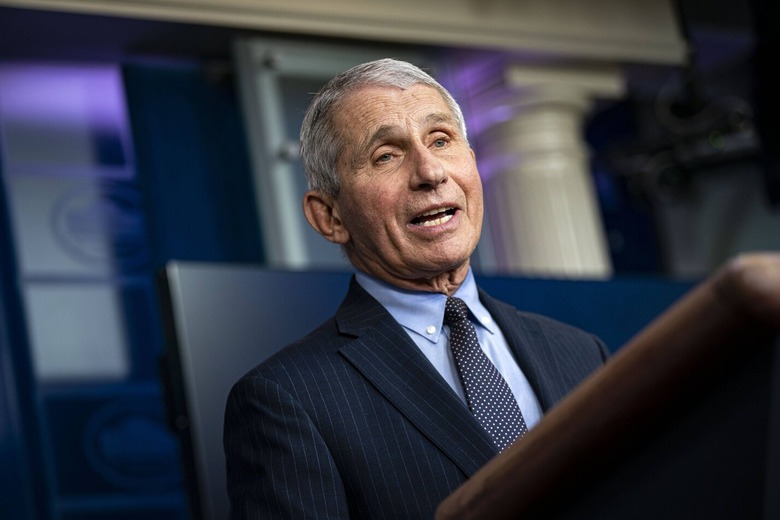This Is Dr. Fauci's Most Important Coronavirus Warning Right Now
- Dr. Anthony Fauci warned that the South African coronavirus mutation (B.1.351) poses a risk of reinfection to people who have already had COVID-19.
- The more infectious variant can evade neutralizing antibodies and lead to reinfection. Vaccine efficacy may also be impacted.
- Fauci explained that speeding up the vaccination campaign can provide additional protection, even against mutations like the South African strain. Vaccines can protect against severe illness and death, and they can impact the virus's ability to multiply.
The number of daily coronavirus infections in the US has been dropping for a couple of weeks, but it's still well over 100,000 per day. The number of vaccinations so far — more than 32 million first doses — isn't enough to impact the course of the epidemic and significantly reduce transmission, especially at a time when three scary SARS-CoV-2 mutations are spreading all over the world. The UK, South African, and Brazilian mutations were detailed in December and January, and many countries have already confirmed infections with the new strains. The South African variation (B.1.351) is the most dangerous of the three because it can evade neutralizing antibodies in some cases.
With these mutations in mind, Dr. Anthony Fauci gave what might be his most important warning yet. Reinfection is possible, and that's why it's crucial for people to remain vigilant as we speed up vaccination efforts.
The South African mutation can evade antibodies found in monoclonal drugs and the plasma of COVID-19 survivors. That means it can reinfect some people who had COVID-19 in the past, as the immune system isn't as ready to fight the mutation. It also means that vaccine efficacy may be reduced for the South African mutation.
A case of reinfection with the South African strain was just confirmed in Israel, where a 57-year-old man went for a COVID-19 test after returning from abroad with a runny nose. The test came back positive, and genetic testing proved it was the South African strain. The man had a mild case and did not infect other people close to him at home. It's unclear if a prior COVID-19 infection reduces the severity of illness upon reinfection.
Fauci told CNN's Wolf Blitzer that health experts in South Africa have already witnessed a high reinfection rate.
Dr. Fauci explained that while vaccines might not work as well against the South African mutation or the other versions, they can still help prevent serious illness, which can lead to hospitalization and death. Fauci made similar comments about the UK variant a few weeks ago. At the time, those were reassuring, as he said UK health experts did not see the local mutation infecting COVID-19 survivors. That was also an indication that the current vaccines would work.
The health expert also said that vaccines could reduce the spread of the mutated forms of the virus and prevent them from becoming dominant. If immunization campaigns are sped up, vaccines could also prevent other mutations from appearing, as the virus would not be able to replicate as widely in the population.
"Viruses cannot mutate if they don't replicate. And if you stop their replication by vaccinating widely and not giving the virus an open playing field to continue to respond to the pressures that you put on it, you will not get mutations," Fauci said during a virtual news briefing with the White House COVID-19 response team. "You need to get vaccinated when it becomes available as quickly and as expeditiously as possible throughout the country."
Vaccine makers including Pfizer and Moderna have already tested their drugs against the mutations. The Pfizer/BioNTech vaccine works against the UK strain and has some efficacy against the South African variation. Separately, Moderna is now working on a booster shot for the South African strain.
As of February 1st, nearly 5.95 million people have been fully vaccinated against the novel coronavirus.
